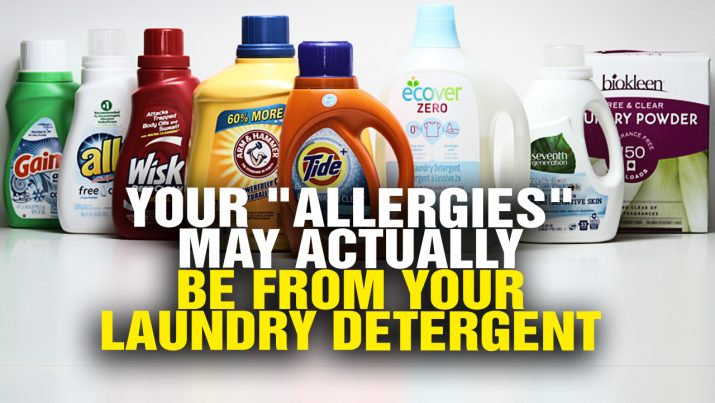
Health Ranger: Are your ALLERGIES actually caused by your laundry detergent?
Thursday, October 11, 2018 by Ralph Flores
http://www.products.news/2018-10-11-are-your-allergies-caused-by-your-laundry-detergent.html

It turns out people can suffer from allergies caused by triggers found in their laundry.
In his Health Ranger Report podcast, Health Ranger Mike Adams talks about the link between allergies and exposure to fragrance chemicals.
“In nearly every case, the same people [who complain of having allergies] are wearing, like, a bombshell of toxic fragrance chemicals — and they don’t know it,” Adams explains. “You might be one of these people and you don’t know it.”
Watch the episode here, only at REAL.video:
In the U.S., the demand for laundry detergents has grown steadily in recent decades, in particular, due to the number of homes with their own washing machines. It’s not just detergents that are on the rise: The usage of liquid cleaning products, fabric softeners, and even detergent tablets is expected to significantly increase in the coming years.
However, this increase also means that more people are at risk of exposure to harmful (and potentially toxic) chemicals in these products. A study led by the University of Washington found that most laundry products contain at least one chemical that is regulated as toxic or hazardous. These include carcinogenic air pollutants and volatile organic substances that are considered toxic under federal laws. What’s worse is that manufacturers aren’t required to list these fragrance chemicals as an ingredient not only in laundry products but also in air fresheners and personal care products. In his podcast, Adams said that the common culprits include dryer sheets, laundry detergent, fabric softener, and even hairspray. (Related: Your Laundry Detergent may be Hazardous to Your Health.)
People who are sensitive to these toxic chemicals, however, will be able to detect its presence. Most people, Adams explains, have been so saturated with these chemicals that their ability to smell these products has been burned out.
“But people like me — and others who are sensitive — we can absolutely tell you’re wearing it,” he added. “We can smell you from 20 feet away.”
Pointing out this information, he noted, takes caution. For the most part, people can get easily offended when confronted with this information — which is ironic, since these are the same people who complain of watery eyes and runny nose all the time.
“The problem with allergies is you,” he stressed. “You’re doing it to yourself, so stop doing it.”
What’s more, the adverse effects of laundry products do not come just from exposure. Most people who have allergic reactions to these products make the problem worse by buying over-the-counter medications which carry their own side effects and health risks.
The result? People dosing on toxic drugs, while they’re wearing toxic perfume in their dryer sheets and spraying their hair with their toxic hairspray, according to Adams, only to see the symptoms persist.
“If you get rid of all these toxic chemicals in your life, you’ll find that you don’t probably have all the allergies you’re told you have.”
More on detergent allergies
Detergent allergies aren’t just caused by direct exposure to the powder or liquid: Oftentimes, it’s also seen after wearing clothes that have been washed using these detergents or from residues left on clothing or bedding. Here are some common symptoms (aside from a runny nose and watery eyes) that indicate detergent allergies:
- Itching, burning, or stinging. If a person experiences skin that itches in patches, especially in areas that come into contact with clothing — it may be a sign of allergic contact dermatitis because of detergents. According to the American Academy of Dermatology, laundry detergents have various chemicals that are known to cause these types of reactions.
- Inflammation. In some cases, the affected area may start to swell, developing heat, redness, and a raised rash.
Get the latest updates on the Health Ranger Report on REAL.video.
Sources include:
Tagged Under: Tags: allergies, badhealth, chemicals, dermatitis, detergent allergies, detergents, harmful chemicals, personal care, priority, toxic chemicals, toxins





